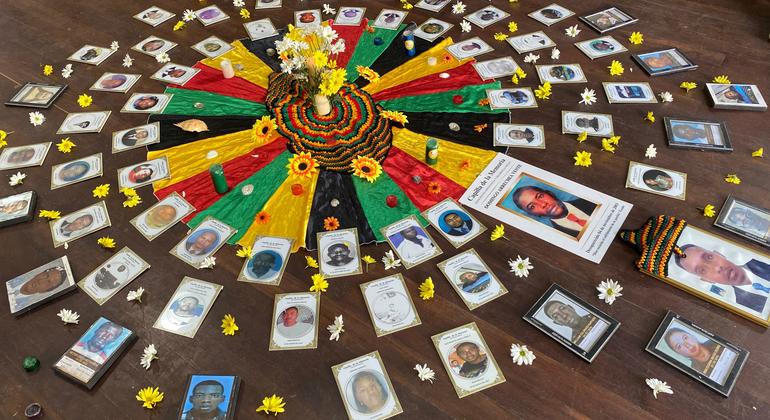‘Break the cycle of violence’ through prevention and peacebuilding, says Security Council


Elizabeth Spehar, Assistant Secretary-General for Peacebuilding Support, spoke at the Council’s high-level debate on the UN Secretary-General’s A New Agenda for Peace.
Launched in July 2023, the policy brief shows how conflict prevention and peacebuilding can help reverse trends in violence while minimizing the human and economic costs of war.
Break the cycle
“Prevention and peacebuilding can break the vicious cycle of violence and lay the foundations to ensure sustainable development is possible for all“, she said.
The meeting – convened by Sierra Leone, the Council’s president for August – comes amid escalating conflict around the world.
Ms. Spehar outlined how investing in three areas can advance these goals, namely promoting and supporting voluntary national peacebuilding efforts, ensuring unity, and strengthening partnerships and resources.
Support national efforts
Referring to the first point, she said ONEA New Agenda for PeaceEmphasizes national ownership as the guiding principle for effective peacebuilding and prevention efforts.
“It also highlights the need to include diverse voices, needs and participation from all levels of society, which can help make peace more sustainable,” she added.
In this regard, she cited the example of the Central African Republic, where United Nations Peacebuilding Fund has supported programs to strengthen the capacity of women to act as community mediators, thereby helping to prevent conflicts and maintain peace at the community level.
A comprehensive approach to prevention
The second area that needs investment ensure unity and a comprehensive approach to prevention and maintenance of peace.
She said A new agenda for peace emphasizes the need to address the root causes of violence and conflict, not just the symptoms.
“The best way to prevent societies from falling into crisis is to ensure they are resilient through investing in sustainable and inclusive development and inclusive governance,” she said.
“Here is why A new agenda for peace call for accelerated implementation 2030 Agenda for Sustainable Development, and address inequality, marginalization and exclusion.”
Partnerships and Resources
The last area to invest in Strengthening key partnerships and ensuring more resources for prevention and peacebuilding.
Ms. Spehar noted that partnerships with regional and sub-regional stakeholders continue to grow in both importance and scope.
She described the regular activities between the United Nations Security Council and the African Union for Peace and Security Council (AUPSC), and a similar partnership between United Nations Peacebuilding Commission and AUPSC is considered “promising”.
However, she stressed that more could be done in terms of specific follow-up and outcomes of these meetings.
Military spending is rising
On the issue of resources, she said it was “worrying to see continued declines in investments in peace and conflict prevention while military spending has increased worldwide”, which accounts for only a small portion of total official development assistance (ODA).
She told the Council that last year the rate for OECD (Organisation for Economic Co-operation and Development) countries was 10 percent – a 15-year low.
“At the same time, just last year, research showed that Violence costs the world nearly $20 trillion – or 13.5 percent of global GDP“ .
She stressed the need to continue exploring partnerships between the United Nations and international financial institutions (IFIs), from the World Bank to regional development banks, to ensure that development investments contribute to lasting peace.
Lessons from Sierra Leone
Meanwhile, Sierra Leone’s transition from a devastating civil war 22 years ago to peace today “is a beacon of hope and a testament to the power of commitment, dialogue and inclusive peacebuilding,” said Hawa Samai, secretary general of the country’s Independent Commission for Peace and National Cohesion (ICPNC).
The Commission was established in 2020 as part of broader efforts to prevent, manage and mitigate conflict. It has established peace coalitions, as well as early warning and response mechanisms, across 16 districts in Sierra Leone.
“By engaging multiple local stakeholders, ICPNC ensures that peacebuilding efforts are based on community realities and needs.“, she said.
Stay proactive
Ms. Simai noted that a key lesson from her country’s experience is the importance of community-led and -driven conflict prevention, which helps resolve conflicts before they escalate.
“A proactive, post-conflict, gender-sensitive and inclusive perspective is essential for effective conflict prevention, and remaining apolitical is crucial to gaining access and trust among all key stakeholders,” she said.
She added that “networking with national and international partners has proven to be a significant strength” and called on governments and donors to recognise and support national peace infrastructure.
Security Sector Reform
Bankole Adeoye, African Union Commissioner for Political, Peace and Security Affairs, called New agenda“a major blueprint for recalibrating the global peace and security architecture with a greater emphasis on conflict prevention.”
He also stressed the need for greater focus on security sector reform and said direct support was being provided to AU member states embarking on the process.
The AU has also developed framework guidelines on disarmament, demobilization and reintegration (DDR) for ex-combatants to support institutional design and capacity building for countries in post-conflict transition.
He said post-conflict reconstruction and development are centred on the new policy adopted by the AU General Assembly, which also mentions “youth inclusion, child protection and environmental sustainability as pathways to sustain and support peacebuilding”.
The AU’s Post-Conflict Reconstruction Centre, based in the Egyptian capital Cairo, is now fully operational and has been described as “a turning point”, he added.


